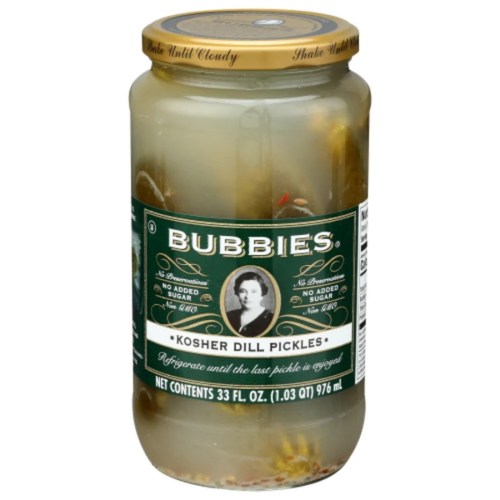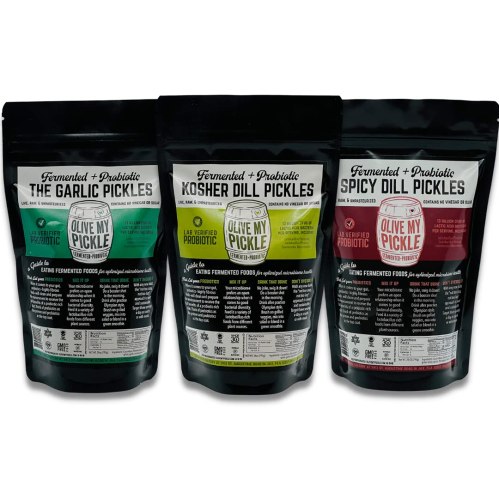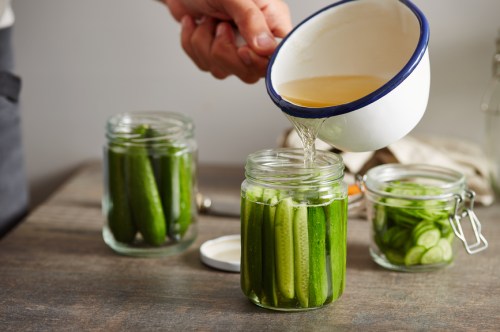Our editors independently select these products. Making a purchase through our links may earn Well+Good a commission
Few things are more polarizing than pickles. Either you love them with passion, or you vehemently detest them. But for those of us that can’t live without pickles, a large container of ’em gets to claim permanent residency in the fridge for snacking, drinking, garnishing, and the like.
Experts in This Article
South Carolina-based gastroenterologist and author of Fiber Fueled
One more reason to love pickles, according to Will Bulsiewicz, MD, a gastroenterologist and New York Times bestselling author of the books Fiber Fueled and The Fiber Fueled Cookbook, is that certain kinds have impressive microbiome-boosting potential… depending on how they’re made.
We caught up with Dr. Bulsiewicz to learn the best types of pickles for gut health and what to look for on the ingredient label when shopping at the supermarket—including what it means when pickles are made with and without vinegar and the implications it can have on gut health and digestion.
Some types of pickles are better for gut health, according to a gastro
Let’s fill you in on the back story here. In a recent Instagram video by @theguthealthmd, Dr. Bulsiewicz explains that there are two main types of pickles—and, no, we’re not talking about dill or bread and butter. We’re referring to pickles made with and without vinegar.
Why does this matter? According to the gastroenterologist, vinegar-based pickles don’t offer as many gut-promoting benefits as those made through fermentation. Rather, Dr. Bulsiewicz explains that “real” pickles (without vinegar) are a product of naturally-occurring bacteria that produce acids—and a vinegar-like taste—by way of fermentation. These are the pickles that have the most gut-boosting live active cultures.
That said, the vast majority of pickle products on grocery shelves do contain vinegar. But know that this isn’t a serious cause for concern, and it certainly does not mean that you should immediately toss them away. After all, Dr. Bulsiewicz says vinegar-based pickles have benefits, too. Phew.
Why fermented pickles have more gut health benefits than vinegar-based ones
To be clear: Vinegar, by itself, has health benefits. “I have nothing against vinegar-based pickles; I think they’re delicious. I also think they’re healthy. After all, they’re basically just cucumbers with vinegar and spices,” Dr. Bulsiewicz says. “These pickles are also a product of fermentation, produced by microbes. They contains polyphenols, which are plant-based antioxidant compounds that have an anti-inflammatory effect and are also good for your gut microbes,” he says.
That said, although vinegar-based pickles are good for the gut, fermented ones might be even better. Here’s why. “Lacto-fermentation is a slightly different approach to pickle production. Instead of splashing vinegar over cucumbers, you instead set up a bunch of cucumbers in a jar of brine with herbs and spices. Naturally existing on the surface of the cucumber will be living microbes like Lactobacillus plantarum or Leuconostoc mesenteroides, which represent the cucumber’s microbiome. And when you place the cukes into the brine, you allow these microbes to multiply and grow,” Dr. Bulsiewicz says.
This is where the real magic happens. These microbes naturally create vinegar with vitamins and exopolysaccharides (extracellular macromolecules with potential antibiotic properties) as they grow. “Additionally, microbes like Lactobacillus plantarum are probiotic. This means that you get the health benefits associated with them, such as Lactobacillus plantarum, which has shown beneficial effects for metabolic syndrome, high cholesterol, obesity, type 2 diabetes, inflammatory bowel diseases, and brain health,” Dr. Bulsiewicz says.
Why you should opt for fermented pickles whenever possible
Though vinegar-based pickles have benefits, fermented ones simply offer more in terms of gut health potential. Certainly, vinegary pickles taste great and can be potentially quicker to make in mass production (fermenting pickles is a longer, slower process). Still, Dr. Bulsiewicz isn’t buying into it. “If I were a pickle CEO, I’d be splashing that vinegar too! But I’m a doctor, and I don’t want to leave added health benefits on the table when they could have been in my tummy,” he says.
“A recent study from Stanford University found that adding fermented food to your diet can improve your gut health in a matter of weeks. You get so much more when you opt for lacto-fermented pickles,” Dr. Bulsiewicz adds. Fortunately, fermented pickles are easy to find, like Bubbies Pure Kosher Dills or Fermented & Probiotic Olive My Pickle, both available on Amazon. Or, Dr. Bulsiewicz recommends making them at home with his garlicky dill recipe that you can find in The Fiber Fueled Cookbook.

Bubbies Whole Kosher Dill Pickles — $10.00
Bubbies Pure Kosher Dills are made without sugar, vinegar, or preservatives.

Olive My Pickle Fermented & Probiotic Pickles, Pack of 3 — $40.00
Olive My Pickles are fermented and probiotic-rich pickles that come in varieties like kosher dill, spicy dill, and garlic.
An RD shares the benefits of drinking kombucha:
Sign up for the Well+Good SHOP Newsletter
Get exclusive deals on wellness, beauty, fitness, and food products that have been hand-picked by our editors.
Got it, you've been added to our email list.








